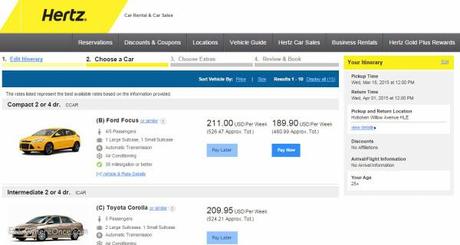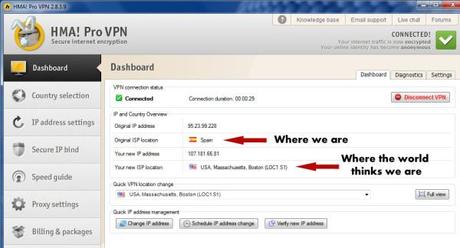If you’ve ever had the sneaking suspicion that online booking sites are messing with you, that’s because they are. They know where you’ve been. They may very well know your buying history and your preferences. And they’re increasingly using all of that information against you.
One thing we’ve found particularly egregious is something we’ll call “locational pricing.” That’s when different people in different locations are charged different prices for the same exact thing. Mostly we’ve found that locals get better rates than travelers even when buying stuff online. It’s an extension of the Vagabond Tax we’ve commented on previously. But at least this one you can beat.
As an example, we recently searched Hertz to get prices on a rental car for when we’re back in the U.S. this coming spring. We conducted that search from Thailand and were a bit shocked at the quoted price of $380 per week, before taxes and fees.

The first search from Thailand gave us a $380 weekly rate for a compact car.
Minutes later we conducted a new search using the exact same rental dates, the exact same rental company, the exact same pick-up location and the exact same compact car class only this time we got quoted a price of just $190 per week instead of $380. How did we cut our rental bill exactly in half? By fooling Hertz.com into thinking we were located in the U.S. instead of in Thailand.

After changing our computer’s virtual location to New York we got a price of $190 for the same car.
And we did that by using our Virtual Private Network (“VPN”). If you’re unfamiliar with VPNs this might be a good time to get acquainted. You can quickly get up to speed with the primer we prepared discussing How to Stream U.S. Television When Traveling Abroad.
In that article we talk about how to use a VPN to fool sites like Netflix and Amazon into thinking you haven’t left the U.S. so you can use their streaming services overseas. But you can also use that same feature to fool sites like Hertz into thinking you’re a local customer rather than a gouge-worthy tourist.
Because some companies obviously charge out-of-towners a premium, we now perform two searches for our travel services; one from wherever we are and one pretending to be locals. The first search we’ll do normally to collect a bunch of prices. We’ll then clear our browser cookies and use our VPN software to change our proxy server to one that is close to where we’re traveling. In the case of Hertz above, we were trying to rent a car in Northern New Jersey so we chose a proxy server in New York City, just a dozen or so miles from where we wanted to pick up the car. That simple step saved us $400 for our two-week booking.

With a VPN you can change the virtual location of your computer sometimes resulting in significant cost savings
We don’t always find lower prices by doing this, but sometimes we do. And on those occasions we easily save enough to more than cover the yearly subscription cost of our VPN.

